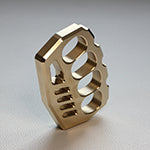When it comes to self-defense, one question that often arises is whether brass knuckles are more effective than other self-defense weapons. Brass knuckles, also known as knuckle dusters, have been around for centuries and have a reputation for being a potent tool for personal protection. However, it is essential to examine their effectiveness in comparison to other self-defense weapons to make an informed choice.
Brass knuckles are specifically designed to increase the force of a punch by concentrating the impact onto a smaller surface area, typically the wearer's knuckles. The construction of brass knuckles typically involves a metal plate with finger holes that allow the user to slip them onto their fingers securely. The force generated by a punch delivered with brass knuckles can be significantly amplified, potentially incapacitating an attacker with one strike.
However, it is worth noting that the effectiveness of brass knuckles heavily relies on the user's physical strength and technique. Without proper training or physical fitness, the advantage offered by brass knuckles may be diminished. Furthermore, the use of brass knuckles might not be suitable for all situations, as their application is limited to close-range combat and requires the user to be in direct contact with their assailant.
In comparison to other self-defense weapons, such as pepper spray, stun guns, or batons, brass knuckles offer a more hands-on approach. Pepper spray, for example, provides a non-lethal means of defense by incapacitating an attacker temporarily. Stun guns deliver an electric shock to immobilize the assailant momentarily. Batons offer an extended reach and can be used to strike an attacker from a short distance. Each of these alternative weapons has its advantages and disadvantages, depending on the specific circumstances.
Factors such as ease of use, legality, and personal preference should also be taken into consideration when choosing a self-defense weapon. Brass knuckles, for instance, may be restricted or even illegal in some jurisdictions. It is crucial to research and understand the laws regarding self-defense weapons in your area before making a purchase.
Additionally, practical considerations like portability and concealability should not be overlooked. While brass knuckles may be compact and easy to carry, they may not be as discreet as other self-defense options. For those who value subtlety, alternative weapons like pepper spray or personal alarms might be more suitable.
You can check out our collections of brass knuckles here
Understanding the Mechanics and Design of Brass Knuckles
In this section, we will delve into the mechanics and design of brass knuckles, discussing why they are considered an effective tool for self-defense.
Brass knuckles, also known as knuckle dusters, are handheld weapons that consist of a metal plate with fingerholes. They are typically made of brass or some other durable metal. The design allows the user to slip their fingers through the holes, with the metal plate resting across the knuckles. This positioning gives the user a secure grip, enhancing the impact when striking an assailant.
One of the key factors that make brass knuckles effective is their ability to concentrate force. By concentrating the impact area to a smaller surface, the force is magnified, increasing the effectiveness of each strike. This can be vital in self-defense situations where quick and powerful strikes are necessary to incapacitate or fend off an attacker.
Another advantage of brass knuckles is their versatility. Unlike other self-defense weapons that require specific techniques or skill sets, brass knuckles can be used intuitively. Since most people have a natural instinct to throw a punch, the familiarity of the motion makes it easier to use brass knuckles effectively without extensive training.
While brass knuckles offer many advantages, it's important to note that using them carries legal implications in many jurisdictions. Their potential as a deadly weapon has led to different restrictions and outright bans in some areas. It's crucial to research and understand the legality surrounding brass knuckles in your specific location before considering them as a self-defense option.
When considering self-defense weapons, it's essential to explore alternative options as well. Pepper spray, stun guns, and personal alarms are popular alternatives that can provide a sense of security without the potential legal ramifications that come with brass knuckles. Each alternative has its own pros and cons, and it's crucial to weigh these factors before making a decision.
Exploring the Legality and Restrictions Surrounding Brass Knuckles
When it comes to self-defense weapons, it is crucial to be aware of the legality and restrictions surrounding their use. This holds true for brass knuckles as well. These devices can potentially increase the effectiveness of strikes, but their ownership and use are subject to various laws and regulations in different jurisdictions.
In the United States, the legality of brass knuckles varies from state to state. Some states classify them as illegal contraband, while others only prohibit carrying them in specific circumstances, such as during the commission of a crime. For example, California, Illinois, Michigan, and Vermont categorize brass knuckles as illegal weapons, with penalties varying from fines to felony charges.
On the other hand, there are states like Texas, Nevada, and Arizona where brass knuckles are legal to possess for self-defense purposes. However, even in states where brass knuckles are legal, there may be additional restrictions on their use. It is advisable to thoroughly research and understand the specific laws in your jurisdiction to avoid any unintended legal consequences.
Outside of the United States, the legality of brass knuckles may vary significantly. Many countries classify them as weapons, and possession or use without proper authorization can result in criminal charges. It is crucial to familiarize yourself with the laws governing self-defense weapons in your respective country or region before considering the acquisition or use of brass knuckles.
It is worth noting that the restrictions and legal considerations surrounding self-defense weapons extend beyond brass knuckles. Various alternatives, such as pepper spray, stun guns, and batons, may also be subject to specific laws and regulations. In some cases, these alternatives may be more widely available and legal to carry for personal protection, making them a more viable option for many individuals.
Factors to Consider When Choosing a Self-Defense Weapon
When it comes to personal safety, many individuals consider carrying a self-defense weapon. While the effectiveness of brass knuckles is often questioned, it is essential to explore and understand alternative self-defense weapons and the factors to consider when choosing one. specific practical considerations will help you make an informed decision and select the best self-defense weapon for your needs.
- Accessibility and Portability: One crucial factor to consider is how easily accessible and portable the self-defense weapon is. Ideally, you want a weapon that you can readily access in case of an emergency. Brass knuckles are small and lightweight, making them easy to carry and conceal, but alternative weapons like pepper spray or a personal alarm can also be compact and convenient to carry in your pocket or bag.
- Legal Restrictions: It is crucial to understand the legal restrictions surrounding self-defense weapons in your jurisdiction. While brass knuckles may be illegal in many places, other options like pepper spray or stun guns may be legally permitted. Familiarize yourself with local laws and regulations to ensure your chosen weapon is legal and won't land you in legal trouble.
- Effectiveness and Ease of Use: The effectiveness and ease of use of a self-defense weapon are significant factors to consider. While brass knuckles can provide a powerful punch, they do require training and practice to be used effectively. Other weapons like pepper spray or personal alarms may be easier to use, allowing you to quickly incapacitate or deter an attacker without requiring close physical contact.
- Range and Reach: The range and reach of a self-defense weapon can also impact its effectiveness. Brass knuckles, being a close-quarters weapon, require you to be in close proximity to your attacker. If you prefer a weapon that allows you to maintain distance, options like a stun gun or extendable baton may be more suitable, providing you with a longer reach and increased personal space.
- Personal Strength and Fitness: Consider your personal strength and fitness level when choosing a self-defense weapon. Brass knuckles rely on physical strength and contact, which may not be suitable for everyone. If you have limited physical strength, options like a personal alarm or a compact taser can provide you with a more reliable means of defense.
- Psychological Impact: The psychological impact a self-defense weapon can have on both you and your attacker is another factor to consider. While brass knuckles may intimidate some potential attackers, the presence of pepper spray or a stun gun can also deter and disorient them without causing significant harm.
Wanna purchase some brass knuckles, check our “arsenal” of brass knuckles here.
Conclusion
Ultimately, the choice of self-defense weapon depends on individual preferences, strengths, and circumstances. It is recommended to seek proper training or guidance before relying on any self-defense tool. Ultimately, the most effective self-defense strategy involves a combination of awareness, mental preparedness, and physical techniques to ensure one's personal safety.
By taking all these factors into account, individuals can make informed decisions about which self-defense weapon aligns best with their specific needs. Whether it is brass knuckles, pepper spray, or other alternatives, the ultimate goal is to possess a reliable and effective tool that provides confidence and a sense of security in potentially dangerous situations.

